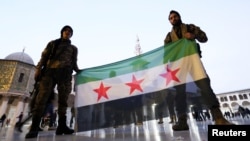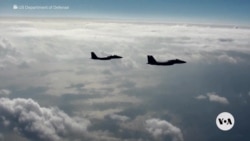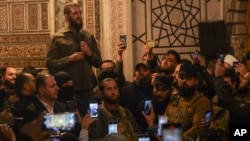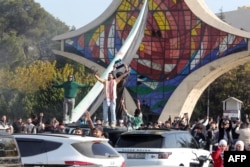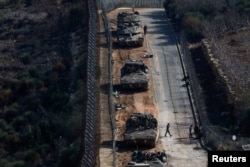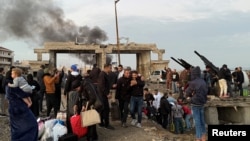Syrian rebels say leader Abu Mohammed al-Golani met for the first time Monday with the outgoing prime minister following the lightning advance by rebels who ousted President Bashar Assad.
A statement posted on the rebels' Telegram channels said Golani met with Mohammed Ghazi Jalali to “coordinate a transfer of power.”
Jalali told Sky News Arabia TV on Monday, “We are working so that the transitional period is quick and smooth.”
He said most Cabinet ministers are still working from offices in Damascus.
However, the U.N. resident and humanitarian coordinator for Syria, Adam Abdelmoula, told The Associated Press that some key government services had shut down as anxious state workers stayed home.
At the United Nations, Syria’s ambassador, who was appointed by the Assad regime, told reporters that his delegation had received instructions from the new authorities to continue doing their job during the transition.
“We are with the Syrian people. We will keep defending and working for the Syrian people. So we will continue our work till further notice,” Koussay Aldahhak said.
He said the country and people are witnessing a new era of change.
“Syrians are looking forward for establishing a state of freedom, equality, rule of law, democracy, and we will join efforts to rebuild our country, to rebuild what was destroyed, and to rebuild the future -- better future of Syria for all Syrians,” he said.
Meanwhile, the U.N. Security Council met late Monday behind closed doors at the request of Russia, which supported Assad militarily during the nearly 14-year Syrian civil war. U.N. Syria envoy Geir Pedersen and U.N. peacekeeping chief Jean-Pierre Lacroix both provided briefings.
“The council, I think, was more or less united on the need to preserve the territorial integrity and unity of Syria, to ensure the protection of civilians, to ensure that humanitarian aid is coming to the needy population,” Russian Ambassador Vassily Nebenzia told reporters after the meeting.
“The situation needs to be stabilized; there has to be an inclusive political process, and also there should not be a resurgence of terrorist forces,” China’s envoy Fu Cong told reporters. “The U.N. has a big role to play in all of these.”
Many questions remained Monday about who will lead the country and how it will try to recover after years of war and more than five decades under the rule of the Assad family.
Israeli troops deployed Sunday to the U.N.-monitored buffer zone in the Golan Heights, with Prime Minister Benjamin Netanyahu saying the move was necessary to protect Israelis after Syrian forces abandoned their positions. Israeli Foreign Minister Gideon Saar said Monday it was a “limited, temporary” step.
“For our part, the peacekeepers at UNDOF [U.N. Disengagement Observer Force] informed the Israeli counterparts that these actions would constitute a violation of the 1974 Disengagement Agreement that there should be no military forces or activities in the area of separation, and Israel and Syria must continue to uphold the terms of that 1974 agreement and preserve stability in the Golan,” U.N. spokesperson Stephane Dujarric told reporters of the Israeli deployment.
Syria’s envoy also said he had written to the United Nations to protest the Israeli move, as well as attacks on several military installations in the country.
Kremlin spokesperson Dmitry Peskov told reporters Monday that Russian President Vladimir Putin decided to grant asylum to Assad. Peskov said there were no plans for Putin to meet with Assad, and he declined to comment on Assad’s location.
Russian news agencies said Sunday that Assad and his family had arrived in Moscow.
Turkish Foreign Minister Hakan Fidan said his country hopes for a “new Syria” that has good relations with its neighbors and helps bring regional stability.
"We expect international actors, especially the United Nations, to reach out to the Syrian people and support the establishment of an inclusive administration," Fidan said in a speech to ambassadors.
A spokesperson for China’s foreign ministry said Monday that Beijing was watching the developments in Syria and that the “future and destiny of Syria should be decided by the Syrian people.”
U.S. Secretary of State Antony Blinken said Monday that the United States is determined to prevent the Islamic State group from reestablishing safe havens in Syria.
"We have a clear interest in doing what we can to avoid the fragmentation of Syria, mass migrations from Syria and, of course, the export of terrorism and extremism," he said at an event at the State Department.
In a statement late Sunday, he said the United States will support international efforts to hold Assad and others accountable for abuses against the Syrian people and detention of civilians such as U.S. journalist Austin Tice.
Assad was accused of war crimes and crimes against humanity during the country’s civil war, including a 2013 chemical weapons attack on the outskirts of Damascus.
More than half a million Syrians died in the war, and the conflict displaced at least half the country’s pre-war population of 22 million people.
Assad’s fall prompted crowds to gather and celebrate in Damascus and elsewhere.
Rebels opened prisons where the Assad government held thousands of people as part of its crackdown against the uprising that began in 2011 against his rule.
There was continued focus Monday on the Saydnaya prison outside Damascus, where the White Helmets rescue organization said it deployed teams to search for potential hidden, underground cells where people may still be held.
Assad’s downfall was stunningly quick, with the rebels capturing the cities of Aleppo, Hama and Homs in a matter of days as the Syrian army ended any opposition. The rebels are led by the Hayat Tahrir al-Sham group (HTS) which has its origins in al-Qaida and is considered a terrorist organization by the United States and the United Nations.
The group’s leader, Golani, is a former al-Qaida commander who cut ties with the group years ago and says he embraces pluralism and religious tolerance.
Syria still faces divides, with Turkey-backed opposition fighters battling U.S.-allied Kurdish forces in the north, and the Islamic State group still active in some remote areas.
VOA United Nations Correspondent Margaret Besheer contributed to this report. Some information came from The Associated Press. Agence France-Presse and Reuters.




